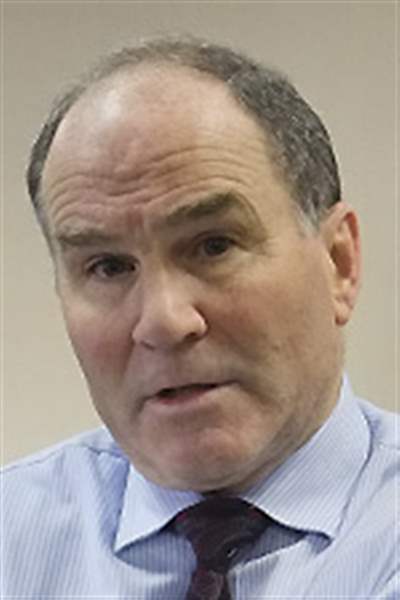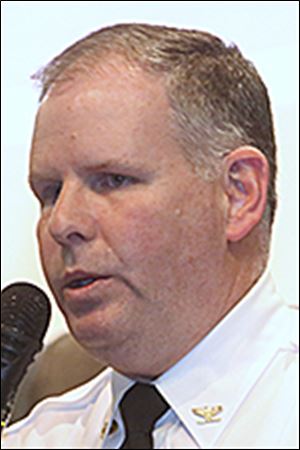
Chief says hiring limits could hurt police diversity
2/29/2016
Navarre
THE BLADE
Buy This Image
Recent proposals that would limit who can serve as a police officer in Ohio could adversely affect minority recruitment, a local police chief cautioned.
A state commission is considering whether to include some misdemeanor convictions as grounds for disqualification, and to require a polygraph or similar test for would-be officers. Currently, a felony conviction eliminates a potential recruit.

Navarre
Oregon police Chief Mike Navarre said reducing the pool of applicants for a greater number of crimes reduces police chiefs’ discretion. Those hiring new officers should instead review the totality of a situation for applicants, he said.
Chief Navarre cited an example from 2011, when he was Toledo’s police chief. A promising black recruit, who served in the U.S. Marine Corps, had a felony conviction. When he was 18, the recruit fled officers in a suburban city. Police there insisted he plead to a felony charge, he said.
“If that had happened in Toledo, probably 99 percent of the time that case plea bargains to a misdemeanor,” Chief Navarre said.
The man successfully expunged his record, but couldn’t become an officer without the governor’s pardon. Chief Navarre said a young adult’s split-second decision, such as a one-time bar fight without a weapon, shouldn’t necessarily restrict a career in law enforcement.
A greater range of experiences, he said, allows a new officer to better handle himself or herself in a physical confrontation.
The new uniform requirements for potential police recruits also would include passing physical fitness, psychological, and drug tests along with truth-verification or polygraph tests.
Polygraph tests shouldn’t replace a thorough background check, Chief Navarre said. He expressed concern about the cost of the polygraph tests, which can be about $1,000 each.
Police academies at schools such as Owens Community College may pass on the expense to students, further restricting applicants, he said.
A recent review of Toledo Police Department employment records determined about 80 percent of sworn officers are white, 13 percent black, and 6 percent Hispanic. The department's minority rates have decreased compared to previous years, and the city has grown more diverse.
Chief Navarre said the department historically ranked well in reflecting Toledo’s population and when measured against other Ohio police forces.
“They make a concerted effort, and that’s what it takes,” he said.
Chief Navarre was among 18 people appointed early last year to an Ohio Task Force on Community-Police Relations. Gov. John Kasich's office formed the group in response to police-involved fatalities across the country.

Kral
Current Toledo police Chief George Kral said he agrees additional criminal disqualifications would hurt recruitment.
Already, the department loses high-quality applicants if those potential recruits have a felony record because of a youthful mistake made years earlier. Narrowing the field makes it more difficult to choose from a wide range of recruits, he said.
“I want to increase the diversity. I want to mirror the community that we serve,” he said.
Polygraph tests, too, are expensive and time-consuming. It would be unfortunate to further limit others because of cost, Chief Kral said.
Attorney General Mike DeWine said diversity in police departments is important, and the review board will consider it before deciding whether to expand the criminal disqualification standards.
Mr. DeWine said the essential component of the uniform-requirements proposal is the psychological test.
“Many departments already have all those, but there are many departments that do not require that,” Mr. DeWine said.
The Ohio Peace Officer Training Commission is set to meet in May to discuss polygraphs and other truth-verification tests.
Fayette County Sheriff Vernon Stanforth serves as chairman of the commission. He said community leaders have requested better standards for potential officers, but are now reluctant to see these suggestions in place.
Sheriff Stanforth said he expected support for increasing disqualifications that seemed like common sense. From a young age, people are taught that actions have consequences.
“You hear this all your life, ‘What you do today will affect your tomorrow,’ ” he said. “Now we're saying, ‘No, we don't want those qualifiers in there.’ ”
It’s a surprising response, especially because the commission has not yet discussed these measures. Many of the proposals follow recommendations from a government task force on policing.
Although the standards would decide who could enter the academy, police departments can set additional requirements, he said.
Sheriff Stanforth is concerned about requiring truth-verification tests because such tests involve subjectivity on the part of the test-givers. A perceived failure would be public record and could harm future employment, he said.
He also is concerned about the cost of drug screening potential recruits. Whether it is a $20 test from a drug store or a physician’s assessment that costs hundreds of dollars, either the student, academy, or state would bear the burden, he said.
If the commission reaches a consensus on the criminal disqualification and polygraph tests, a state board will review the proposals for addition to administrative code.
The same standards would be set for police academies held by schools and police departments.
Contact Ryan Dunn at: rdunn@theblade.com, 419-724-6095, or on Twitter @rdunnblade.